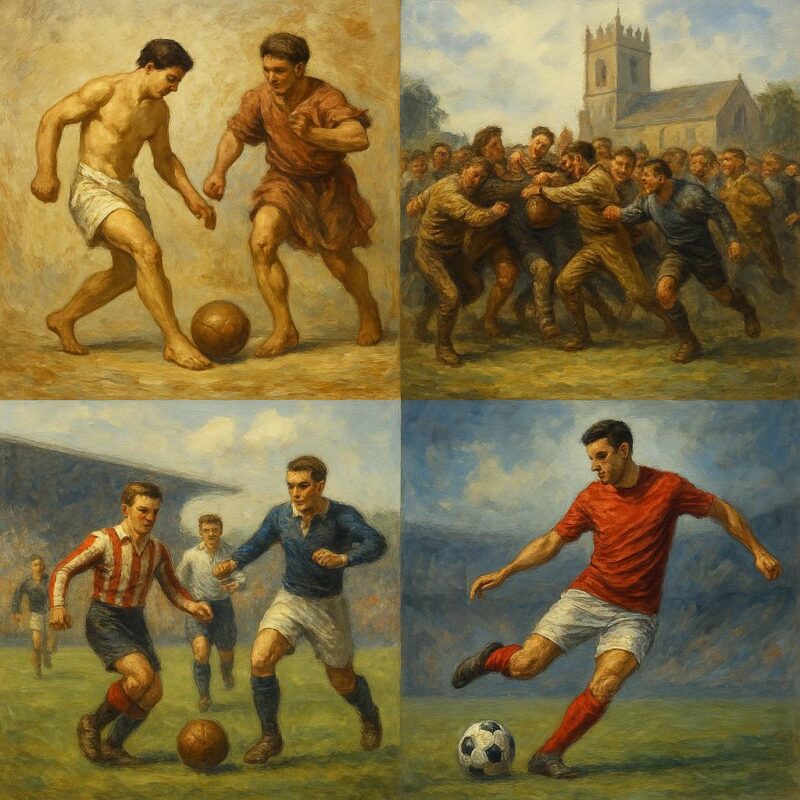The History of Football: From Ancient Roots to a Global Phenomenon
Introduction
Football, known as soccer in some parts of the world, is the most popular sport on the planet, boasting billions of fans across every continent. Its origins trace back thousands of years, evolving through various cultures before becoming the highly structured and competitive game we know today. This article explores the rich history of football, highlighting its ancient beginnings, the development of modern rules, its globalization, and its impact on culture and society.
Ancient Origins of Football
Football-like games have existed for millennia, with different civilizations playing their own versions long before formalized rules emerged.

- China (Cuju): One of the earliest recorded forms of football dates back to the Han Dynasty (206 BCE – 220 CE). Cuju, which translates to “kick ball,” involved kicking a leather ball into a net without using hands. It was played for recreation and military training.
- Mesoamerica (Ullamaliztli): In ancient Mesoamerican civilizations, a ball game played with rubber balls held religious significance. While different from modern football, it shared similarities in using a spherical ball and involving strategic movement.
- Medieval Europe: Football-like games became common in medieval England, often played between entire villages. These chaotic matches had few rules and were occasionally banned due to their disruptive nature.
The Birth of Modern Football
The transformation of football from unregulated local games to an organized sport took shape in 19th-century England.
- Public Schools and Early Codification: English schools played crucial roles in developing standardized football rules. Schools such as Rugby and Eton had their own versions, some allowing carrying the ball (which later led to rugby) and others emphasizing kicking.
- Formation of the FA (1863): The Football Association (FA) was established in England, marking a defining moment for the sport. The FA laid down the first official rules, distinguishing association football from rugby.
- Expansion to Europe and South America: British sailors, merchants, and expatriates introduced football to other countries, leading to rapid adoption across Europe and South America.

Growth of International Football
As football spread, the need for international competitions arose.
- FIFA and the World Cup: Founded in 1904, FIFA (Fédération Internationale de Football Association) sought to regulate international football. The inaugural FIFA World Cup took place in 1930 in Uruguay, with the host nation winning the tournament.
- UEFA and Club Competitions: In Europe, club competitions such as the UEFA Champions League and domestic leagues in England, Spain, Italy, and Germany fueled football’s popularity.
- South American Influence: Countries like Brazil, Argentina, and Uruguay became football powerhouses, producing legendary players like Pelé, Diego Maradona, and Lionel Messi.
Evolution of Football Tactics and Playing Styles
Over time, football has evolved tactically, with different playing styles emerging across generations.
- Early 20th Century: Formations such as the 2-3-5 were dominant, emphasizing attacking play.
- Total Football (1970s): The Netherlands revolutionized the game with Total Football, a tactical system that allowed players to switch positions seamlessly.
- Modern Tactical Approaches: Today, football is defined by tactical flexibility, pressing strategies, and data-driven approaches used by teams like Manchester City, Liverpool, and Barcelona.
Impact of Technology on Football
Football has embraced technology to enhance fairness and entertainment.
- VAR (Video Assistant Referee): Introduced in major leagues and tournaments, VAR helps referees make more accurate decisions.
- Goal-Line Technology: Ensures that referees correctly determine whether the ball has crossed the goal line.
- Data Analytics: Clubs use advanced analytics to scout players, plan tactics, and prevent injuries.
Football’s Cultural and Economic Influence
Football is more than just a sport; it is a cultural and economic powerhouse.
- Social Impact: Football unites people across social and economic backgrounds, with events like the World Cup fostering national pride.
- Economic Influence: Top clubs generate billions of dollars through broadcasting rights, sponsorships, and merchandise sales.
- Football and Politics: The sport has played roles in political movements, from Nelson Mandela using the 1995 Rugby World Cup to promote unity in South Africa to teams protesting against racism.
Conclusion
Football’s journey from ancient ball games to a globally dominant sport is a testament to its universal appeal. Whether played on dusty streets or grand stadiums, football continues to inspire and unite people worldwide. With technological advancements and evolving playing styles, its future remains as bright as ever.
Questions and Answers on Football History
Q1: Where did football originate?
A: Football-like games have ancient origins, with early versions played in China (Cuju), Mesoamerica (Ullamaliztli), and medieval Europe.
Q2: When were the first official rules of football established?
A: The first official rules were established in 1863 by the Football Association (FA) in England.
Q3: What role did British sailors and merchants play in the spread of football?
A: British sailors, merchants, and expatriates introduced football to other countries, leading to its expansion across Europe and South America.
Q4: When was FIFA founded, and what is its significance?
A: FIFA was founded in 1904 to regulate international football and later organized the first FIFA World Cup in 1930.
Q5: What are some key tactical evolutions in football history?
A: Tactical evolutions include early 2-3-5 formations, Total Football in the 1970s, and modern pressing and data-driven strategies.
Q6: How has technology impacted football?
A: Technology has enhanced football through VAR, goal-line technology, and data analytics for player performance and injury prevention.
Q7: What are some economic impacts of football?
A: Football generates billions in revenue through broadcasting rights, sponsorships, and merchandise sales, making it an economic powerhouse.
Q8: How has football influenced social and political movements?
A: Football has played roles in social and political movements, such as Nelson Mandela’s use of sports for unity and protests against racism.
